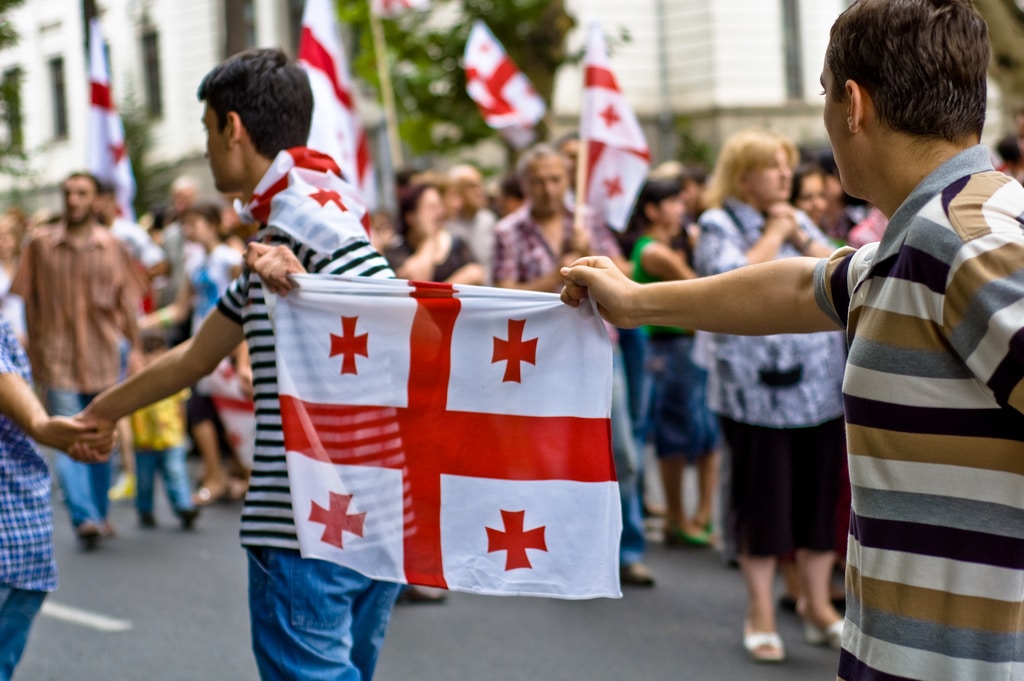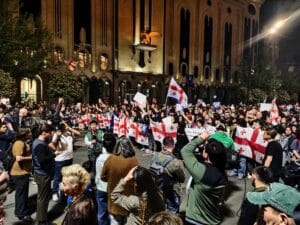Thousands of people took to the streets in Tbilisi in the weekend of 12 and 13 May to protest an anti-drug raid by police forces on two popular nightclubs. The demonstrations – and counterdemonstrations – were repeated throughout the week. Demonstrators, many dancing to the techno music that played from speakers, demanded the resignation of the interior minister for his harsh anti-drug policy. Critics of the government argued that the recent police operations were aimed at intimidating the flourishing club scene in the capital. The Georgian club scene has become synonymous in recent years with the freedom of expression of the younger generation. Although Georgia is considered one of the most progressive countries of the Southern Caucasus, the country maintains a set of conservative values. The so called ‘’rave-olution’’ seems to be the next generation’s attempt in countering this.
Raids, demonstration and counterdemonstration
Just before the police raid that took place in the early hours of May 12, eight suspected drug dealers were arrested and several people who protested the arrests were also detained on the spot. According to the Interior Ministry the raid was a reaction to a string of what are believed to be drug-related deaths in the capital in recent months. The head of the criminal police department, Mamuka Chelidze, stated that the interior ministry “has been conducting intensive investigative measures for the last three months to establish the facts of the drug trade in Bassiani and Gallery nightclubs.”
People who were in the clubs at the moment of the raid and subsequently took to the streets, suspected however that the elaborate show of action was aimed at the club scene itself. A large part of the conservative population view the young subculture in the clubs, which is often associated with freedom of expression, LGBTI community and more liberal views on drugs, as immoral. Protesters therefore suspected that the government wanted a show of strength. “The state started playing their game and showed society that on a Friday night it can storm a nightclub with hundreds of special forces, just to detain eight people” one demonstrator commented.
That these kinds of sentiments are present in Georgian society became also evident later on the day of May 12. At least two far-right groups started a counterdemonstration claiming that they were against the ‘’drug-scene’’ and ‘’LGBTI propaganda’’. One far-right group even announced the creation of a ‘’national guard army’’ in order to protect Georgia from these kinds of ‘’abnormalities’’.
Government reaction
An organizer of the rallies in Tbilisi stated that the protests would continue if the Interior Ministry failed to change its approach to antidrug efforts. Several groups showed their intent to convene in front of the parliament every weekend to pressure the government to change its policy. In reaction to the call for new protests several government officials called for dialogue. Tbilisi Mayor Kakha Kaladze stated that Interior Ministry officials and protest leaders would meet to discuss the potential changes in antidrug policies. Prime Minister Giorgi Kvirikashvili addressed the protesters on television on May 13th. He called for calm amid the rival rallies, stating that any “confrontation in the country and split in society is unacceptable for the Georgian authorities and people.”
Nonetheless talks with the Interior Ministry haven’t had any significant outcome so far. On May 19th Minister of Internal Affairs Giorgi Gakharia stated “We created discomfort for 70-100 people who were getting ready for entertaining in the club, sorry, but it was needed for public interest’’.
Conservative culture
A big part of Georgia’s population maintains a relative conservative stance on a variety of issues. The Georgian Orthodox Church has a high degree of influence in the country. This is also evident in politics. Although a 2014 antidiscrimination law provides protection against discrimination on the basis of various factors such as sexual orientation and gender identity, the LGBTI community faces societal discrimination on a variety of levels. Occasionally there are incidents with serious violence.
Human Rights Watch and Freedom House have called the anti-drug laws harsh and disproportional. Drug related arrests often involve long sentences, prohibitive fines, and deprivation of other rights. With these kinds of laws in place, police forces, they say, often overstep their boundaries and use excessive measures to arrests suspects. In some cases people were detained several hours for drug tests without a clear indication of a drug-related violation. The international human rights watchdogs also believe Georgia also doesn’t have an effective independent mechanism for investigating abuse by police officers. Investigations often lead to either nothing or corruption charges that result in people being removed from their offices without further prosecution of abuse of power.
As evidenced by the recent protests the younger generation is open to more progressive ideas. Frequent demonstrations for equal wages, universal healthcare, and a more humane drug policy have shown that a large portion of the youth want societal change. Even though the government seems open for dialogue, change goes slow.
Sources:
rferl I rferl II rferl III Georgian Journal HRW Freedom House



